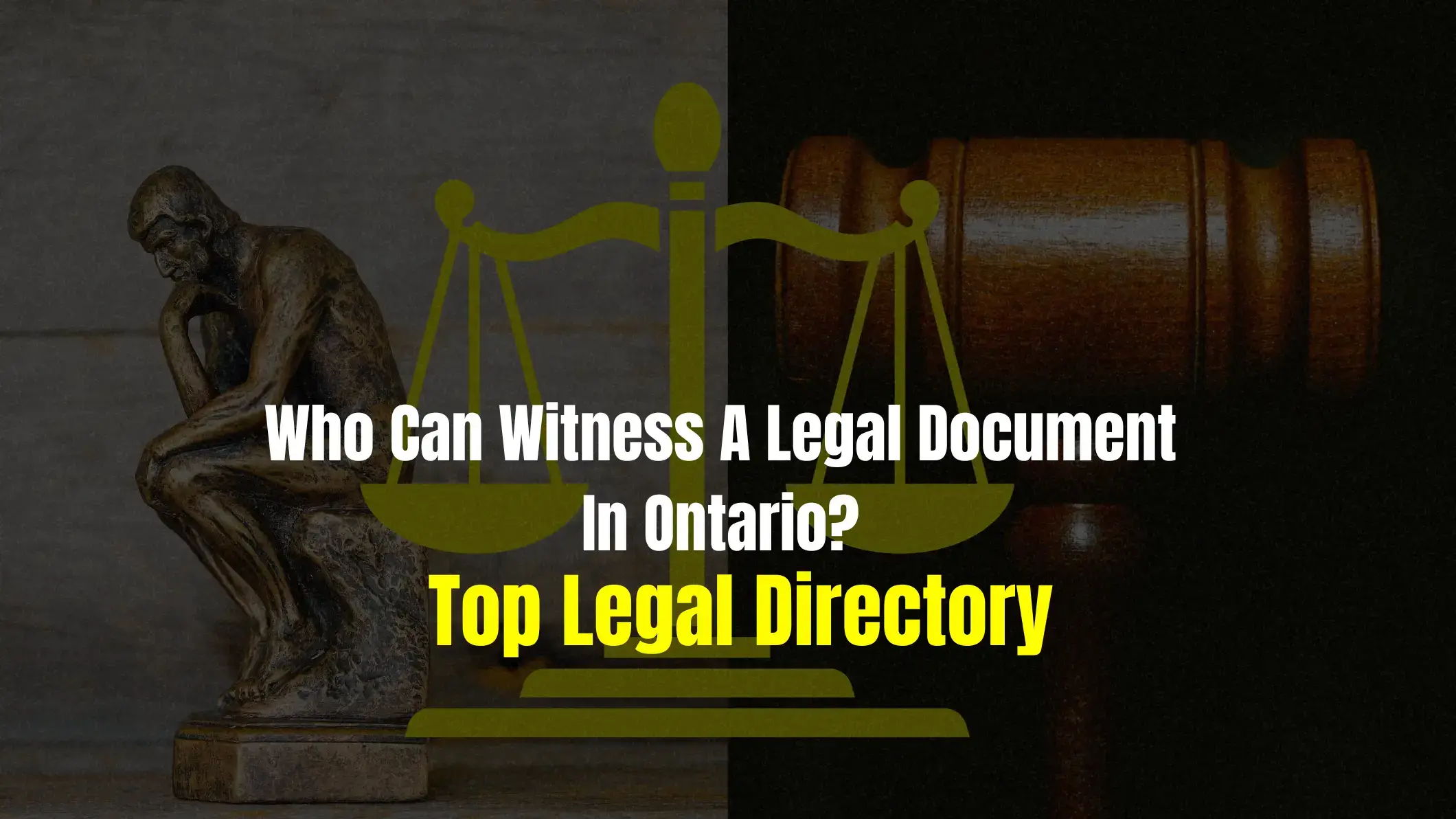Who Can Witness A Legal Document In Ontario?
Understanding the legal nuances related to authenticating documents can be challenging, particularly when verifying their legitimacy in line with regulations.
One might frequently wonder: who can witness a legal document in Ontario? Identifying the appropriate certified person not only facilitates a smooth procedure but also protects your rights and interests.
In Ontario, witnessing a legal document is typically the responsibility of professionals like a Notary Public, a Commissioner for Taking Affidavits, or a provincially licensed lawyer.
These experts play a pivotal role in upholding the document’s legitimacy and aligning it with provincial legal standards.
Who Can Witness a Legal Document in Ontario – Quick Guide
The province boasts a structured and precise guideline when witnessing legal documents in Ontario.
Primarily, the duty falls upon three categories of professionals: Notary Publics, Commissioners for Taking Affidavits, and licensed lawyers. Each individual brings unique expertise to the table, ensuring the signatory comprehends the document’s implications.
Additionally, other authorized individuals might be enlisted depending on the nature of the document.
It’s not just about observing a signature; it’s about ensuring the signatory’s understanding, their free will in signing, and the document’s overall compliance with Ontario’s legal standards.
Authorized Witnesses in Ontario
Ontario stands out as a province that places a premium on ensuring the authenticity and legality of documents. With the myriad of transactions and legal activities taking place, having a set criterion for individuals who can legally witness documents is not only prudent but essential. This approach ensures a standardized, efficient, and, most importantly, trustworthy procedure.
Training and Accreditation
To qualify as an authorized witness in Ontario, individuals undergo rigorous training tests and are subsequently accredited by recognized bodies. This formal process ensures that witnesses are well-versed in the legal ramifications of their role and can carry out their duties with the utmost professionalism.
Notary Public
A Notary Public is much more than a mere witness to signatures. They are a beacon of trust in the legal system.
Duties Beyond Witnessing
Apart from their primary role of certifying documents, they also administer oaths, attest to the authenticity of signatures, and sometimes offer legal advice. Their comprehensive training enables them to ensure that the signatory is fully aware of the content and implications of the document they’re signing.
The Seal of Authenticity
The seal and signature of a Notary Public are not mere formalities. They serve as an additional layer of validation, confirming that all legal protocols have been observed.
Commissioner for Taking Affidavits
The role of a Commissioner for Taking Affidavits is specialized and crucial in the legal landscape of Ontario.
Sworn Statements
These professionals come into play when a sworn statement is necessary. They ensure that the individual providing the statement comprehends its significance and is doing so without any coercion.
Legal Safeguard
Their authorization to take oaths and solemn affirmations required by affidavits or statutory declarations acts as a legal safeguard, ensuring the veracity and authenticity of statements.
Licensed Lawyers
Licensed Lawyers in Ontario wear many hats, and one of them is that of a trusted witness.
Advocacy and Beyond
Beyond their roles as advocates or counsellors, their rigorous legal training positions them uniquely to witness legal documents. They ensure that a document is not only compliant with legal requirements but also that the signatory is acting with full awareness.
Other Authorized Individuals
The realm of legal witnessing is not confined solely to the aforementioned professionals.
Depending on the nature of the document, Ontario’s legal system allows for other individuals to act as witnesses.
For instance, certain government forms might have provisions for a broader range of individuals to bear witness, ensuring flexibility while retaining trustworthiness.
Witness Requirements for Different Types of Documents
Every document is unique, and so are its witnessing requirements. They vary based on the document’s legal implications and significance.
Wills and Testaments
Leaving behind a will or testament is a solemn act, ensuring that one’s assets are distributed as per their wishes posthumously.
Stringent Protocols
Given the gravity of such a document, it’s paramount that the witnessing process is stringent. It’s essential to ensure that the witnesses have no vested interest in the will, ensuring unbiased validation.
Power of Attorney
Empowering someone to act on your behalf is a significant decision, and a Power of Attorney (POA) document captures this.
Witnessing Criteria
The nature of the POA determines its witnessing criteria. It’s essential to ensure that the grantor is acting out of free will, fully understanding the authority they’re bestowing.
Real Estate Transactions
Real estate, given its significant financial implications, has its own set of rules when it comes to witnessing documents.
Ensuring Understanding
Given the complexities, a Notary Public or a lawyer often ensures that all parties involved fully understand the transaction’s terms, ensuring transparency and mutual agreement.
Affidavits and Statutory Declarations
Both affidavits and statutory declarations are vital in the legal system, serving as instruments of truth.
While affidavits are sworn statements, statutory declarations are affirmed to be true. The subtle difference between the two dictates their use and significance in legal proceedings.
Witnessing and Confirmation
Given their importance, both require a Commissioner for Taking Affidavits or a Notary Public to witness, ensuring that the signatory understands and stands by their statement.
General Witnessing Guidelines
The act of witnessing a document is steeped in tradition and legality. While specific requirements might vary based on the document type, certain general guidelines remain universal to ensure the integrity of the process.
- Age and Capacity: Every witness stepping into this role must meet basic criteria that attest to their capability.
- Reaching Legal Age: In most legal scenarios, the witness should have attained the age of majority, which is typically 18 years or older. This age stipulation ensures that the witness possesses the maturity to understand the gravity of their role.
- Soundness of Mind: Beyond age, the mental capacity of a witness is vital. They should be of sound mind, which means they fully comprehend the responsibility they’re undertaking and can recall the event if required.
- Impartiality: A document’s integrity hinges on the unbiased nature of its witnessing, making impartiality a cornerstone of this process.
- No Vested Interests: For a witnessing process to be deemed credible, the witness shouldn’t have any vested interest in the document’s content. This ensures that their attestation is based solely on the act of signing and not influenced by potential benefits.
- Presence during Signing: The physical presence of a witness during the act of signing is non-negotiable.
- Firsthand Observation: By being present, the witness can attest to the fact that the signatory signed the document. This firsthand observation is a crucial step in solidifying the document’s authenticity and ensuring that no foul play occurs.
- Verification of Identity: Before the pen touches the paper, the witness has another crucial role – verifying the signatory’s identity.
- Using Government-Issued Identification: A witness should be satisfied with the signatory’s identity, which is often verified using government-issued identification like a driver’s license or passport. This step ensures that the person signing the document is indeed who they claim to be.
The Process of Witnessing
Witnessing isn’t a mere formality; it’s a meticulous procedure ensuring legal compliance at every step.
Preparation
Before the main event, there’s groundwork to be done.
Document Review
The witness first reviews the document, ensuring its completeness and clarity. This ensures they are familiar with its content and can vouch for its entirety.
Identity Verification
As mentioned earlier, verifying the signatory’s identity is paramount. The witness must ensure that the person signing is the rightful signatory.
During the Signing
As the document is being signed, the witness’s role is both observational and confirmatory.
Ensuring Free Will
The witness observes the signatory to ensure they are acting of their own free will, without any external pressure or duress. This ensures that the document’s signing is both voluntary and intentional.
Post-Signing
The responsibilities of a witness don’t end once the document is signed.
Affixing Seals and Signatures
If necessary, the witness affixes any required seals and provides their signature, further validating the document.
Document Storage
In some cases, the witness may store a copy of the witnessed document for records. This acts as an added layer of legal robustness and can be crucial if disputes arise in the future.
Conclusion
Understanding the nuances of who can witness a legal document in Ontario is crucial for anyone venturing into legal agreements or declarations.
With a clear framework in place, Ontario ensures that every document witnessed stands up to scrutiny and serves its intended purpose.
Entrusting this responsibility to trained professionals like Notary Publics, Commissioners for Taking Affidavits, and licensed lawyers ensures that each step in the process is both legally sound and aligned with the best interests of all parties involved.
Whether you’re drafting a will, signing a Power of Attorney, or entering a real estate transaction, knowing the right witness for your document is paramount in safeguarding its validity and your peace of mind.
also read about: how much a lawyer costs in Ontario
FAQs
What qualifications do authorized witnesses in Ontario possess?
Authorized witnesses in Ontario typically hold professional credentials, with Notary Publics, Commissioners for Taking Affidavits, and provincially licensed lawyers leading the list.
Can anyone other than a Notary Public or lawyer witness my will in Ontario?
In Ontario, while a will requires two witnesses, they shouldn’t be beneficiaries or their spouses, ensuring unbiased validation.
How do witnesses in Ontario verify a signatory’s identity during the witnessing process?
Witnesses in Ontario usually require government-issued identification, such as a driver’s license or passport, to confirm the signatory’s identity.
Are there specific guidelines for witnessing real estate documents in Ontario?
Real estate documents in Ontario often necessitate meticulous witnessing by a Notary Public or lawyer to ensure all parties understand the transaction’s terms.






